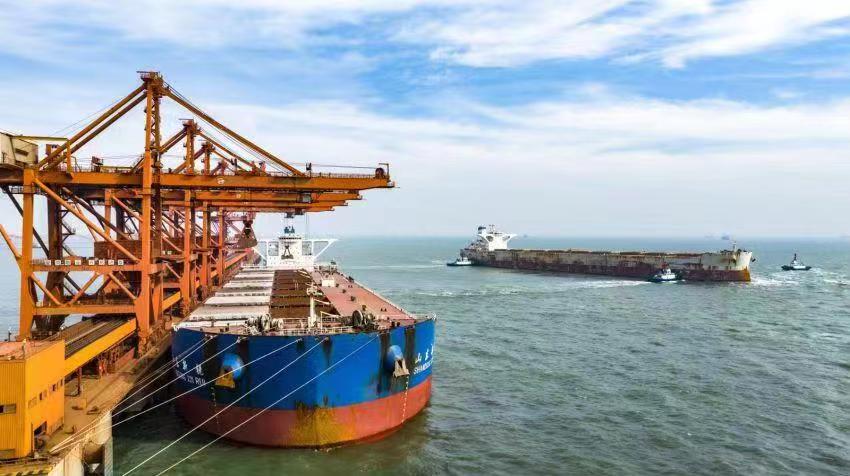
A cargo ship docks at the smart and low-carbon Caofeidian Port in Hebei province. (PHOTO: Caofeidian Port)
By?ZHONG?Jianli
Hebei, Beijing's neighboring province, is aiming to realize its version of modernization by focusing on innovation.
Zhang Yongqiang, deputy director-general of the provincial department of science and technology, shared a set of data during a recent press briefing: In 2023, the R&D investment in Hebei is expected to increase by more than 10 percent. The number of national high-tech enterprises will reach 13,000, and around 8,000 small and medium-sized sci-tech enterprises will be cultivated. The total amount of technical contracts will exceed 150 billion RMB (20.9 billion USD).
Developing the robot industry
The Tangshan High-tech Industrial Development Zone in northeast Hebei, established in 1992, is developing the robot industry through resource sharing, collaborative innovation and technological transformation.
With the aid of national innovation and incubation platforms, the zone has nurtured a large number of enterprises manufacturing industrial robots and specialized robots.
The robot industry has become one of the most dynamic industries in Tangshan, leading the intelligent manufacturing industry in the city and even in the province.
Switch to clean energy
The Caofeidian Port in Tangshan is transforming into a green and smart port. "More than 80 percent of the outbound transportation in our port use clean energy," Shan Chunpeng, deputy general manager of the port, said.
There are charging piles for electric vehicles, while two belt conveyors with dry fog dust suppression, an economical and effective form of dust control, have been built to transport iron ore directly to the steel mill.
According to Zhou Lijun, director of the management office of the Caofeidian Port Business and Economic Zone, the ore warehouse has nearly a dozen large machinery items that operate unmanned. "Next year, we will try to adopt unmanned ship unloading with the aid of 5G, the BeiDou navigation satellite system and other technologies," Zhou said.
Attractive talent policy
The Xiong'an New Area in Hebei, another new area of national significance following the Shenzhen Special Economic Zone in south China's Guangdong province and Pudong New Area in east China's Shanghai, is a model of high-quality development.
To facilitate the work and lifestyles of the professionals living in the area, it has rolled out the Xiong'an talent card that provides several services including household registration, children's education, transportation, healthcare and finance.
The Beijing-Tianjin-Hebei (Sanhe) Human Resources Service Industrial Park, which opened recently, is the first regional industrial park in China and plays an important role in bringing talents to the region.
"We moved our regional headquarters here because of the favorable environment supporting the development of the park as well as the enterprises in it," said Li Jing, executive president of Risfond, a technology-driven HR service provider.
The trio will conduct a series of experiments in fields such as life science, fluid physics, combustion science and materials science. Notably, this is the first time that fruit flies have been taken on a Chinese space mission as experimental subjects. What made scientists choose fruit flies? What experiment will they undergo?
